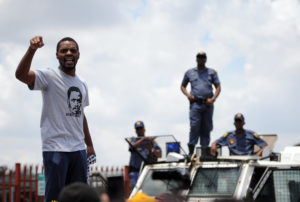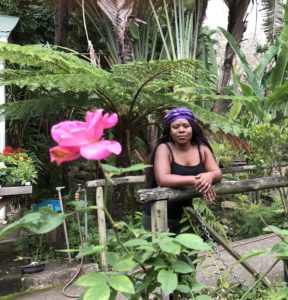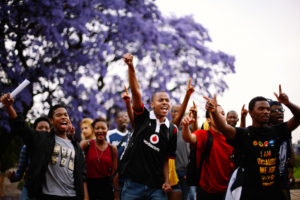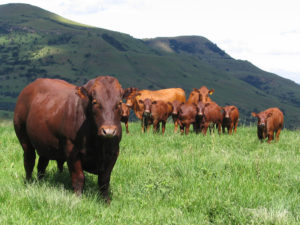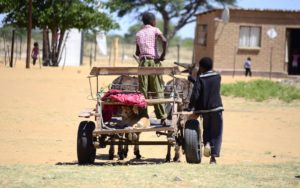Lessons from South Africa’s struggle for the ‘Climate Just Transition’
The recent ousting of former president Jacob Zuma in favour of Cyril Ramaphosa unfolded in the dying throes of 2017 and escalated in a tense series of negotiations between the two leaders leading up to the State of the Nation Address for 2018.
Supporters of Zuma’s regime rallied under slogans of Radical Economic Transformation, drawing its strength from the proposed Mining Charter, an increasingly militant discourse on land redistribution, and a Russian backed nuclear deal as a bulwark against White Monopoly Capital.
On the other hand, Ramaphosa rose to the ascendency under demands for a “new deal”, promising tough action against corruption, “good governance” and stability as part of an attempt at party rejuvenation. As tensions build up within the country and inequality continues to expand at record levels, the numerous freedom dreams that, less than a lifetime ago, animated the harshest moments of the anti-apartheid struggle appear to be wishful idealisms from a time beyond reach.
Now more than ever, there is an urgent need to force open space for the re-examination of South Africa’s transition from formal apartheid, and learn crucial lessons that open up, instead of close down, avenues of struggle going forward.
In wake of vigorous public debate, campaigns and lobbying efforts to challenge the procurement of large scale nuclear power technology alongside renewed interest in renewable energy technologies South Africa is birthed a moment primed with opportunity to examine the concrete tensions facing its path forward.
Recent advances in technology potentially allow states and communities different options to mitigate and adapt to the long-standing impact of fossil fuel based industrialisation while addressing the pressing needs to address basic service delivery. For proponents of fossil fuel-free based alternatives, the growing global support from some social movements, non-governmental organisations and trade unions for the idea of a “Just Transition” to low carbon climate resistant economies, has opened up space to think differently about our collective energy future.
The idea of the “Just Transition” itself, while now encompassing a broad range of uses, originates in the international trade union movement. It was developed in response to the global climate crisis and acts as a means of calling for the need to secure workers’ jobs and livelihoods when economies are shifting to sustainable production and divesting from industries such as defence and warfare while protecting biodiversity.
The challenge for the “Just Transition” however, much like the consequences of climate change itself, remain starkly divided globally along longstanding social and geopolitical inequalities most recently forged through the emergence of capitalism and the accompanying colonial expansion of Europe. Africa, in particular, bears a significant burden of the effects of climate change which threatens local livelihoods through increasingly volatile climatic conditions – from record droughts to flash flooding.
Geopolitical earthquakes made colonial rule untenable
At the level of political economy the development of so-called ‘First World’ owes its wealth from the extractive industries of its colonies. The captured colonies required low levels of industrialisation across areas such as the African continent, with its diversity and local nuances, so as to produce the high levels of unemployment and the low wage labour needed to keep low the cost of the materials for processing in empire.
In contrast, the liberation movements in all their diversity of the post-World War II period, exploded onto the world scene in an era of decolonisation. Two key macro-political shifts were leveraged in a heightened period of global struggle. On the one hand, there was the weakening of Europe politically and economically through attrition for participation in the war and the rise of the Nazi regime in Europe. On the other hand, the ascendance of the United States along with the bitter conflict and proxy wars of the Cold War involving the Soviet Union, provided a counter weight for many newly independent states and movements fighting for self-determination.
These geopolitical earthquakes that shook the world made it increasingly untenable to maintain formal colonial rule and created space for local movements in the colonies and radical left wing movements in empire to push towards the possibility of creating the world anew.
The South African freedom story ushered in under the leadership of a tripartite alliance of trade union federation COSATU, the South African Communist Party and spearheaded by the African National Congress (ANC) entered into a negotiated settlement with the apartheid regime National Party. The negotiations reached their zenith in the first democratic election in 1994 and the formation of a new Constitution in 1996, and devolved into parallel multi stakeholder platforms such as Codesa and the Truth and Reconciliation Commission as a space for brokering a political and economic transition for a burgeoning nation.
This landmark election extended a voting franchise to black South Africans. Reforms in the form of the administrative unification in key state departments – notably, health and education – along with key labour law reforms, cumulatively opened up more space struggle through civil society.
Unification illusive and contradictory
The post-1994 unification story has since been as illusive, contradictory and fraught as the mercurial Rainbow-nation narrative the formed the basis of the new Constitution and dispensation. The continuation of ties to key industries, particularly anchored in the Mineral-Security industrial complex, saw institutions such as the national defence force, DENEL dynamics and the Council for Industrial Research, along with the companies and institutions seated in the South African Chamber of Mines, subjected to state imposed transformation policies championing in particular black representation over deeper structural reforms, divestment and abolition.
Over the course of the transition South Africa became the only state worldwide to willingly embark on a wide scale nuclear weapons disarmament while still proceeding to continue with the controversial “arms deal”, involving billions of public spending in unnecessary military equipment. The deal included nuclear submarines and involved corruption allegations against high ranking ANC officials.
The early economic policy of the country was forged amidst decades of structural adjustment programmes for newly independent nations across the Third World alongside the rise of the welfare social democratic state in the wealthier countries of the geo-political “Global North”.
SA economy opened up to highest bidder
South Africa’s GEAR policy (Growth, Employment and Redistribution) passed in 1998 and was brought to the global stage in Nelson Mandela’s envoy to the big business convention DAVOS in 1999. GEAR saw the once isolated and sanctioned national markets of apartheid era South Africa opened up for sale to the highest bidder among multinational corporations.
The legacy of this programme as it stands can be understood in two ways: the expansion of public private partnerships and the squeeze on public spending for social welfare; and the continuous fiery resistance driven at a community level largely homogenised under the banner of “service delivery protests”. The latter includes the more traditionally organised resistance led by trade unions and civil society organisations who are unceremoniously drafting the new chapters of South Africa’s freedom movement.
The term “Just Transition” in an international context has come to intervene in the climate change debates of the recent past to address a number of dynamic tensions in the movement. This particularly relates to economic exploitation as it relates to labour while appealing to the pursuit of justice alongside the pursuit towards alternatives to harmful existing industries.
The debates animating South Africa’s energy future, a possible “Just Transition” and broader international commitments to the climate crisis tie directly to the fiercest tensions within the diverse forces fighting to end the system of apartheid, colonialism and the oppressive structures they heralded. As such, key historical developments in the trajectory of post-apartheid South Africa and the transitional moments that brought it to fruition offer us potential insights into the possible fracture points in the energy debate going forward.
In March 2018 these exact dynamics came to a head through an urgent interdict applied for by Numsa and lobby group Transform SA. The groups called for a halt to a government decision to greenlight 27 renewable energy Independent Power Producers (IPP) in an effort to re-define the path of the country’s energy future. The basis for the interdict, as deputy general secretary Karl Cloete suggests, was rooted in an attempt to halt a “capitalist capture of renewable energy in favour of a socially-owned, democratically controlled alternative” while also responding to the immediate concerns of major job losses in the coal-fired power sector from which they draw a considerable constituency.
Ramaphosa’s “new deal” creates conflict
This early conflict in Ramaphosa’s “new deal” alongside the activism against the proposed nuclear deal peddled by movements associated with Radical Economic Transformation platform have both surfaced different on sides of the coin of the risk of large scale capital investment.
For the energy sector, while capital and development go hand in hand, the debate on democratic alternatives has since struggled to move from policy, political platforms and research. A recent example of these dynamics was represented in the release of the Mandela Initiative Think Tank’s draft report on strategies to overcome poverty and inequality, which introduced renewable energy as a ‘particular focus of sustainable growth’.
This framing failed to centre ownership and production opportunities introduced by the possibilities of decentralised small generation, and emphasised the dynamics around energy cost, sales and potential for cross subsidisation. The danger of subsuming renewable energy under the a banner of ‘sustainable growth’ lies in the adoption and consequences of the use of this concept by institutions like the World Bank and the International Monetary Fund who, among others, have played key roles in commodifying basic services across Africa and large parts of the world.
“Just Transition” creates opportunity for a battle of ‘what comes next’
The notion of a “Just Transition” potentially offers a terrain for contestation that leaves open the battle for ‘what comes next’ while decisively holding open a door for leadership from organised labour whose ongoing role and success carry the thrust of struggle to come.
With this said, beyond the emphasis on the need for leadership from organised labour and the centring of ownership and production, the challenges around the transformation and unification of the state apparatus loom large over the prospects of any serious large-scale infrastructure development in Africa.
Political violence resulting from undealt with aspects of the South African state formed through colonialism impact rural communities and urban municipalities severely. The burning of schools in Vuwani, Limpopo involving a politicised conflict over the boundaries of the local municipalities stand testament to the reality that a “Just Transition” cannot simply be an economic or infrastructural investment, but must be developed together with political solutions that address the deep painful legacy of politicised identities, native dispossession and forced relocation.
The recent passing of Nomzamo Winifred Madikizela-Mandela, a former leader of uMkhonto we Sizwe (MK) and ANC stalwart during the height of the apartheid repression, brings into sharp focus once again the pain, blood and bitter disagreements carried through into the birth of the new nation.
For many organisations inside and beyond the tripartite alliance, the vanguard leadership of the ANC and MK led to demobilisation and conflict for progressive groups based in and operating within the country. For those who dream, hope and sincerely believe that deep structural change requires strong local community mobilisation and action particularly anchored in working class communities, the competing legacies of the unfinished liberation struggle of South Africa stand as dark shadows over the impatient forcefulness of the present push all over the country for basic services, land and the right to a dignified life.
While the global imperatives of decisive action on the impacts of climate change grow more and more urgent with each passing year the diverse historical needs of local communities most affected by the ongoing crises produced by the overriding unequal systems of human ‘development’ demand an approach of flexibility and a commitment to approach the unknown without guarantees, but guided by a common desire to remake the world anew.
If the story of South Africa’s ongoing independence struggle is anything to go by, campaigns under the banner of “Just Transition” will be charged with the difficult task of prioritising investment in infrastructure, supporting movements, building local capacity through education reform, emphasising bringing production into the country and a focus on local autonomy.
This, alongside the specific racialised unequal development of South Africa will also then mean that counter-hegemonic attempts to build renewable based solutions, in lieu of a Climate Just Transition, which de-emphasises the role of funders in research, development and production in favour of aims of socially equality and building resilience will require working consciously with unions and community organisations that have democratic structures and working critiques of capital, who are able to navigate compromised relationships over well connected elite entrepreneurial individuals while still focussing on the importance and significance of black leadership at each level.
(Photo: Gallo Images / The Times / Alon Skuy)

